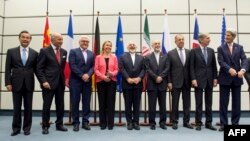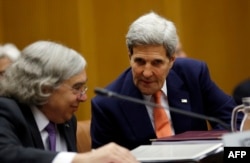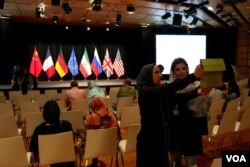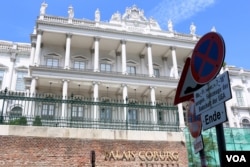World powers are expected to announce in the coming hours a deal reached with Iran that will limit the country's nuclear program in exchange for eased sanctions, ending more than a decade of tempestuous negotiations.
The announcement in Vienna by European Union foreign policy chief Federica Mogherini and Iranian Foreign Minister Mohammad Javad Zarif will conclude weeks of round-the-clock talks to iron out the details of the deal, which will cut back Tehran's nuclear program and allow for oversight by the IAEA.
Mogherini called the deal a "sign of hope" for the world, as she spoke in Vienna ahead of the news conference.
"It is a decision that can open the way to a new chapter on international relations and show that diplomacy, coordination, cooperation can overcome decades of tensions and confrontations," she said.
Zarif called the deal a "win-win" for both Iran and the so-called P5+1 group that includes Britain, China, France, Russia, the United States and Germany.
'Achievement for all'
"We are reaching an agreement that is not perfect for anybody, but it is what we could accomplish and it is an important achievement for all of us," he said.
They spoke before a final meeting among the diplomats who have worked for months on a comprehensive deal.
Iranian President Hassan Rouhani said on Twitter that the process "shows constructive engagement works." He is expected to address the country shortly regarding the agreement.
Details of the agreement were not publicly released ahead of a news conference scheduled for after the final diplomatic meeting.
Basic framework
But the two sides have been working off a basic framework that called for ensuring Iran's nuclear program was peaceful and not used to develop nuclear weapons.
Iran has long insisted its program has only civilian purposes, and its main demand in the agreement involves the lifting of damaging economic sanctions the United Nations and individual nations have imposed during the past decade.
The negotiations in Vienna dragged past multiple deadlines as the two sides worked out important issues such as the access inspectors will have to Iranian sites in order to make sure the government is complying, as well as the pace at which the sanctions would be lifted.
Tuesday's agreement represents a historic compromise after a 12-year standoff that has, at times, threatened to provoke a new conflict in the Middle East. It will take effect only after it clears several hurdles in Washington as well as Tehran.
Conservatives in both capitals have fought against making the compromises needed to reach the agreement.
The greatest hurdle will be the U.S. Congress, where Republicans have a majority and are expected to vote against the deal after a review period of up to 60 days. President Barack Obama is expected to veto any negative vote.
IAEA agreement
Meanwhile Tuesday, Iran and the U.N.'s nuclear watchdog signed an agreement aimed at answering questions about possible military dimensions to Iran's nuclear program.
The International Atomic Energy Agency has tried for years to get answers in its probe, including access to the Parchin military site, but has faced resistance from Iran.
IAEA chief Yukiya Amano said the roadmap of expert meetings and items involving Parchin should allow him to issue a report with the agency's final assessment by the middle of December.
"This is a significant step forward towards clarifying outstanding issues regarding Iran's nuclear program," he said.
VOA's Chris Hannas contributed to this report.







